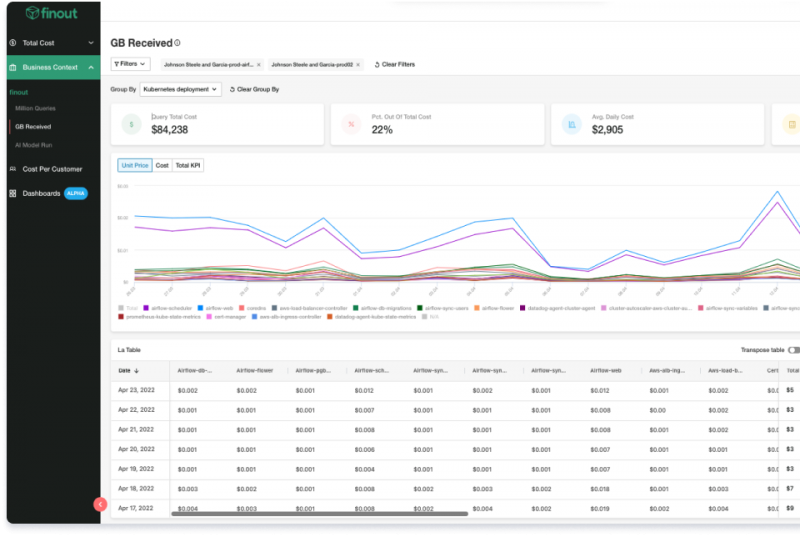 CLOUD
CLOUD
 CLOUD
CLOUD
 CLOUD
CLOUD
FinOps startup Finout Ltd. stepped into the limelight today, announcing it has just closed a $14 million early-stage funding round that brings its total amount raised to date to $18.5 million.
Finout said today’s Series A round was led by Team8 Capital and included participation from investors such as R Squared Ventures, Jibe Ventures and seed investor Ariel Maislos. Prior to this round, the company had raised $4.5 million in a previously unannounced seed funding round led by Pitango First.
Finout is looking to make waves in the so-called “FinOps” market, which is a portmanteau of the words “finance” and “DevOps.” With modern enterprises today making extensive use of cloud-based computing resources and software-as-a-service based apps, Finout believes there will be big demand for its tools, which help companies monitor, manage and ultimately reduce their cloud computing expenditure.
As the company explains, enterprises are increasing their reliance on cloud services with usage-based pricing, where they’re billed according to how much they use a service or app, as opposed to the number of users. Finout said adoption of usage-based pricing has doubled in the last four years, adding that this figure will likely increase as more software companies plan to adopt the same model.
Enterprises are more used to the traditional “seat-based” pricing model, Finout explained, so the switch to a newer model makes it difficult to manage cloud spending.
That’s where Finout believes it can help. What it does is fairly simple. It consolidates a company’s entire cloud spend, including infrastructure services, data warehouses and content delivery networks from public cloud providers such as Amazon Web Services Inc. and Google Cloud, plus middleware from firms such as Twilio Inc. and Auth0 Inc., into a single “mega-bill.”
The mega-bill lays out a company’s entire monthly cloud expenses. Where it gets clever, though, is that it uses advanced assignment rules and virtual tagging to attribute each line item in the bill to its business role, feature, team and product. Moreover, it uses the most granular cost units it can, including native agentless Kubernetes support.
Finout said it can even correlate these costs to unit economics, which it does by way of external metrics and business data from third-party sources such as Datadog Inc., Salesforce Inc. and Looker. Using these tools, it can even add revenue data to show the profitability margin of each cloud service a company uses.

Armed with all of this data, companies can then take action to trim their cloud expenses, cutting out the services that aren’t necessary, or perhaps increasing their use of others to drive greater profit. Finout cited a case study with marketing intelligence firm Singular Labs Inc., which adopted its platform and was able to quickly reduce the number of hours its teams spend on cloud engineering and monitoring.
Finout co-founder and Chief Executive Roi Ravhon said that in the long term, the biggest cost reductions are those that are made at large scale, and hinted at some significant savings to be made by consolidating everything into one mega-bill.
“If you cut costs by 20%, that’s admirable, but only a quick fix,” he said. “To actually optimize costs and achieve better margins, businesses need to measure the cost increase in relation to the business so they can make informed decisions and ensure engineers will take action.”
Cloud cost management has become a major concern for enterprises in recent times, and there are plenty of rival services that have sprung up offering to help solve these headaches. Earlier this month, another startup called Kubecost announced an open-source project called OpenCost that delivers cost monitoring and optimization for Kubernetes environments.
Infrastructure providers are also getting in the game. Last year, NetApp Inc. acquired a firm called CloudCheckr Inc., which analyzes costs on Amazon Web Services, Microsoft Azure and Google Cloud.
However, Team8 Managing Partner Liran Grinberg said there is no cloud cost optimization platform that’s specifically aimed at the surge in usage-based cloud pricing.
“Managing cloud profitability is a board-level priority, which is why we’re so excited to lead this round,” Grinberg said. “Finout is uniquely positioned to enable cost control across cloud platforms by providing an out-of-the-box solution that empowers the modern, cloud-based enterprise to achieve its FinOps goals.”
THANK YOU